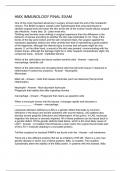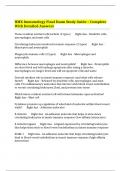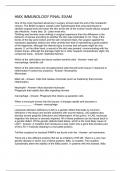Hmx immunology final exam - Study guides, Class notes & Summaries
Looking for the best study guides, study notes and summaries about Hmx immunology final exam? On this page you'll find 180 study documents about Hmx immunology final exam.
Page 2 out of 180 results
Sort by
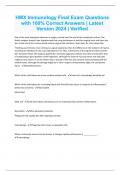
-
HMX Immunology Final Exam Questions with 100% Correct Answers | Latest Version 2024 | Verified
- Exam (elaborations) • 28 pages • 2024
- Available in package deal
-
- $13.49
- + learn more
HMX Immunology Final Exam Questions with 100% Correct Answers | Latest Version 2024 | Verified
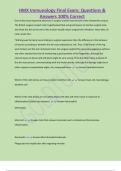
-
HMX Immunology Final Exam; Questions & Answers 100% Correct
- Exam (elaborations) • 43 pages • 2024
- Available in package deal
-
- $15.99
- + learn more
HMX Immunology Final Exam; Questions & Answers 100% Correct One of the most important advances in surgery arrived near the end of the nineteenth century. The British surgeon Joseph Lister hypothesized that using techniques to sterilize surgical tools and clean the skin at the site of the incision would reduce surgical site infections. Years later, Dr. Lister wrote this: "Nothing was formerly more striking in surgical experience than the difference in the behavior of injuries accordi...
HMX Immunology Final Exam
HMX Immunology Final Exam Study Guide – Complete With Detailed Answers
HMX IMMUNOLOGY FINAL EXAM
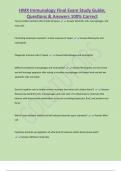
-
HMX Immunology Final Exam Study Guide; Questions & Answers 100% Correct
- Exam (elaborations) • 23 pages • 2024
- Available in package deal
-
- $12.99
- + learn more
HMX Immunology Final Exam Study Guide; Questions & Answers 100% Correct Tissue resident sentinel cells include (3 types) Answer-Dendritic cells, macrophages, and mast cells Circulating leukocytes involved in innate response (2 types) Answer-Monocytes and neutrophils Phagocytic immune cells (2 types) Answer-Macrophages and neutrophils Difference between macrophages and neutrophils? Answer-Neutrophils are short lived and will undergo apoptosis after eating a microbe; macrophages are lo...
HMX Immunology Final Exam Study Guide 2024 with complete solution
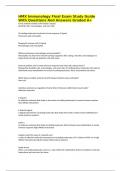
-
HMX Immunology Final Exam Study Guide With Questions And Answers Graded A+
- Exam (elaborations) • 14 pages • 2024
-
- $11.59
- + learn more
HMX Immunology Final Exam Study Guide With Questions And Answers Graded A+ Tissue resident sentinel cells include (3 types) Dendritic cells, macrophages, and mast cells Circulating leukocytes involved in innate response (2 types) Monocytes and neutrophils Phagocytic immune cells (2 types) Macrophages and neutrophils Difference between macrophages and neutrophils? Neutrophils are short lived and will undergo apoptosis after eating a microbe; macrophages are longer-lived and wi...
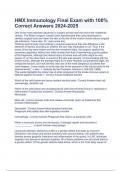
-
HMX Immunology Final Exam with 100% Correct Answers 2024-2025.
- Exam (elaborations) • 26 pages • 2024
-
- $14.99
- + learn more
HMX Immunology Final Exam with 100% Correct Answers . One of the most important advances in surgery arrived near the end of the nineteenth century. The British surgeon Joseph Lister hypothesized that using techniques to sterilize surgical tools and clean the skin at the site of the incision would reduce surgical site infections. Years later, Dr. Lister wrote this: "Nothing was formerly more striking in surgical experience than the difference in the behavior of injuries according to whether...
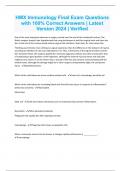
-
HMX Immunology Final Exam Questions with 100% Correct Answers | Latest Version 2024 | Verified
- Exam (elaborations) • 28 pages • 2024
- Available in package deal
-
- $13.49
- + learn more
One of the most important advances in surgery arrived near the end of the nineteenth century. The British surgeon Joseph Lister hypothesized that using techniques to sterilize surgical tools and clean the skin at the site of the incision would reduce surgical site infections. Years later, Dr. Lister wrote this: "Nothing was formerly more striking in surgical experience than the difference in the behavior of injuries according to whether the skin was implicated or not. Thus, if the bones of ...

That summary you just bought made someone very happy. Also get paid weekly? Sell your study resources on Stuvia! Discover all about earning on Stuvia

